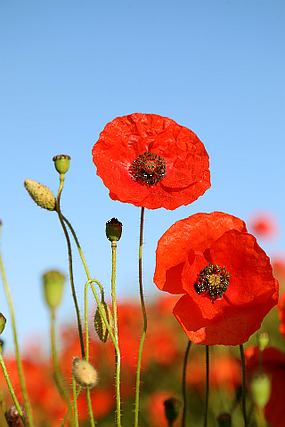
Inspiring Remembrance Activities for schools
We’re proud to continue our meaningful partnership with the Royal British Legion to deliver a powerful programme of events and resources that support Remembrance teaching and learning in schools across the UK.
We'll be working on new events and resources for Remembrance 2026. Before then, please access the recordings and resources from 2025 to support your learners, and to discover how we work with the Royal British Legion, and alongside leading poets and role-models, to mark Remembrance.
Remembrance Assembly 2025
On Tuesday 11 November 2025, in partnership with the Royal British Legion, we held a free online assembly for ages 9 to 14 (years 5, 6, 7, 8 and 9). The Remembrance Assembly was hosted by JJ Chalmers, along with special guests, and is suitable for ages 9 to 14 (pupils from Years 5, 6, 7, 8 and 9, or P6-7, S1-3).
The event included the Two-Minute Silence to mark the Armistice
You can view the Remembrance Assembly 2025 on the National Literacy Trust YouTube channel here.

The Prince of Wales encourages young people to connect with Remembrance
The Prince of Wales featured in a special video message for the Royal British Legion’s Remembrance Assembly on 11 November 2025, encouraging young people to take part in Remembrance to honour veterans and others across the Armed Forces community.
In the video message, The Prince touched on his own military experience, explored the different forms that Remembrance can take, and invited the next generation to discover what it means to them.
Philippa Rawlinson, Director of Remembrance for the Royal British Legion, said: “We’re honoured to welcome the Prince of Wales to this year’s Remembrance Assembly. His contribution, alongside that of veterans and serving personnel, will encourage young people to take part in Remembrance and find their own connection to the Armed Forces community, past and present.”
Poems for Remembrance 2025
Honouring through verse
In the week that marked National Poetry Day (falling on Thursday 2 October), we invited schools to explore the emotional and historical significance of Remembrance through poetry. In collaboration with inspiring poet and author Tomos Roberts (aka Tomfoolery), we offered free, live workshops and classroom resources to help pupils connect with the past and express their reflections creatively.
Learning Sequences: Poems for Remembrance
Available to download below on this page.
Our five-part learning sequence is designed to guide teachers and pupils through the exploration of Remembrance poetry. Pupils will have the opportunity to write their own poems inspired by historical events and personal reflections.
This year’s offer includes:
- Downloadable classroom resources to support teaching before, during, and after the week of National Poetry Day.
- A focus on creative writing, historical understanding and personal expression.
- Two free, live, online poetry workshops led by poet and author Tomos Roberts, aka @probablytomfoolery):
Workshop for pupils aged 7 to 9 (LKS2, P4/5)
Workshop for pupils aged 9 to 11 (UKS2, P6/7)
National Curricula and our resources
Our classroom resources are carefully aligned with the National Curriculum for England, supporting key learning objectives in both English and History for Key Stage 2:
English – Writing Composition
Develop positive attitudes towards and stamina for writing by:
- Writing about real events
- Writing poetry
- Writing for different purposes
History
- Learn about events beyond living memory that are significant nationally or globally
- Discover the lives of significant individuals who contributed to national and international achievements
- Explore significant historical events, people, and places in their own locality
The full national curricula links for Scotland, Wales and Northern Ireland will be included in the downloadable resources available at the start of the new term.
Book club Remembrance resources
Discover our book club resources based on age-appropriate stories to help children explore themes of Remembrance, and to develop core reading comprehension skills.
Now or Never by Bali Rai (Primary)
Ava's Poppy by Marcus Pfister (Early years)
Flo of the Somme by Hilary Robinson and The Day War Came by Nicola Davies (Primary)
Remembrance resources from the Royal British Legion

To access a range of resources for teaching around Remembrance for both Key Stage 2 and Key Stage 3, visit the Royal British Legion Teaching Remembrance page.
These free resources are linked to the National Curriculum. They include using creative writing, music, poetry, art, film and photography to inspire learning, relevant books and reading, and developing discussion and reflection skills.